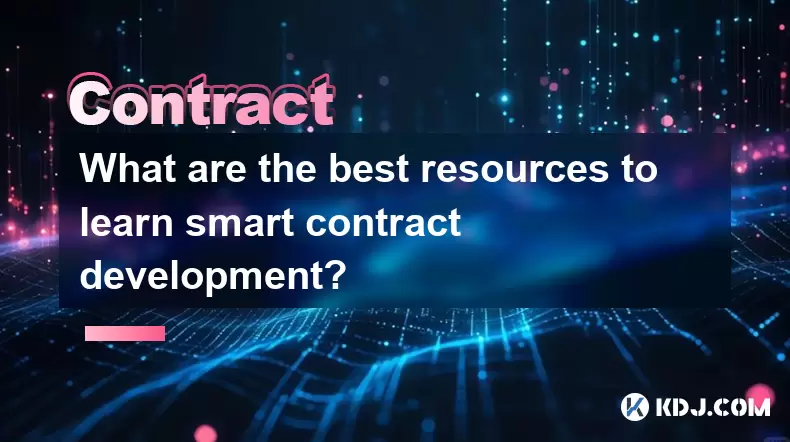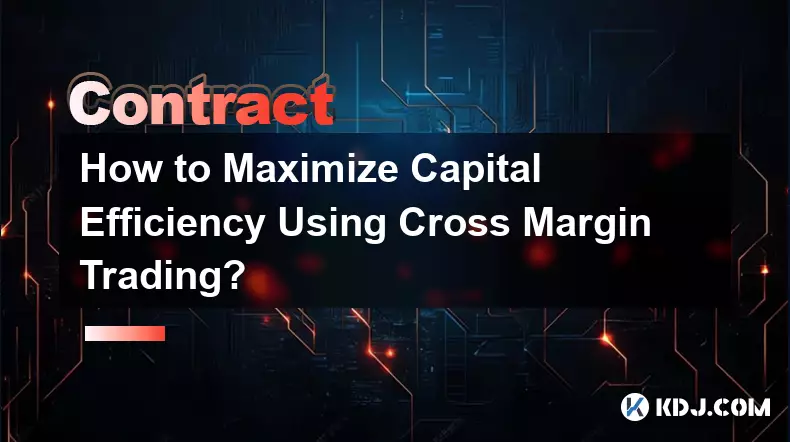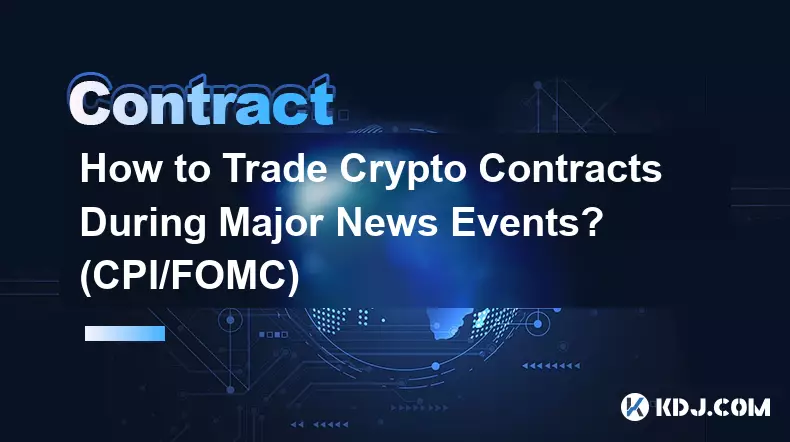-
 bitcoin
bitcoin $87959.907984 USD
1.34% -
 ethereum
ethereum $2920.497338 USD
3.04% -
 tether
tether $0.999775 USD
0.00% -
 xrp
xrp $2.237324 USD
8.12% -
 bnb
bnb $860.243768 USD
0.90% -
 solana
solana $138.089498 USD
5.43% -
 usd-coin
usd-coin $0.999807 USD
0.01% -
 tron
tron $0.272801 USD
-1.53% -
 dogecoin
dogecoin $0.150904 USD
2.96% -
 cardano
cardano $0.421635 USD
1.97% -
 hyperliquid
hyperliquid $32.152445 USD
2.23% -
 bitcoin-cash
bitcoin-cash $533.301069 USD
-1.94% -
 chainlink
chainlink $12.953417 USD
2.68% -
 unus-sed-leo
unus-sed-leo $9.535951 USD
0.73% -
 zcash
zcash $521.483386 USD
-2.87%
What are the best resources to learn smart contract development?
Learning smart contract development is essential for building decentralized systems and mastering blockchain technologies like Ethereum, DeFi, and NFTs.
Jul 15, 2025 at 09:07 pm

Understanding Smart Contracts and Their Importance
Smart contracts are self-executing contracts with the terms of the agreement directly written into code. They operate on blockchain platforms like Ethereum and enable trustless, decentralized applications (dApps). Learning smart contract development is crucial for anyone interested in building decentralized systems or contributing to the growing DeFi, NFT, and Web3 ecosystems. These contracts automatically enforce agreements without intermediaries, making them a cornerstone of modern blockchain technology.
To become proficient in this field, it's essential to start with foundational knowledge of how blockchains work, especially Ethereum, which remains the most popular platform for smart contract deployment. Understanding gas fees, transaction validation, and wallet integration is also critical before diving into actual coding.
Recommended Programming Languages for Smart Contract Development
Before exploring resources, it’s important to know the primary languages used in smart contract development. The most widely used language is Solidity, developed specifically for writing Ethereum-based contracts. It resembles JavaScript in syntax, making it accessible for many developers.
Another notable language is Vyper, which focuses on security and simplicity, ideal for those prioritizing auditability. For non-Ethereum blockchains like Cardano and Solana, languages such as Plutus and Rust are used respectively. Each has its own tooling and ecosystem, so choosing the right one depends on your target blockchain platform.
Online Courses and Tutorials for Beginners
For beginners, structured online courses offer guided learning paths. Platforms like Coursera, Udemy, and Pluralsight provide comprehensive introductions to smart contract development. Some top-rated courses include:
- Blockchain Basics by Coursera – lays the groundwork for understanding blockchain concepts.
- Ethereum and Solidity: Comprehensive Developer’s Guide on Udemy – dives deep into writing real-world smart contracts.
- Pluralsight’s Blockchain Fundamentals – offers insights into various blockchain architectures and their implications for smart contracts.
These courses often include hands-on labs, quizzes, and downloadable materials that reinforce learning. Many also cover tools like Truffle, Hardhat, and Remix IDE, which are essential for developing and testing contracts.
Interactive Learning Platforms and Coding Challenges
Practical experience is vital when learning to develop smart contracts. Interactive platforms like CryptoZombies, Buidl.it, and ChainShot allow users to learn by doing. These websites offer gamified experiences where you build projects step-by-step.
- CryptoZombies teaches Solidity through creating a zombie game using smart contracts.
- Buidl.it provides real-time coding environments where you can write and deploy contracts instantly.
- ChainShot offers interactive workshops focused on dApp development from scratch.
These platforms emphasize learning through trial and error, helping solidify concepts faster than passive reading alone. Additionally, they often simulate real-world scenarios, such as handling errors, optimizing gas usage, and integrating with front-end frameworks.
Community Resources and Developer Documentation
Engaging with developer communities and official documentation is invaluable for continuous learning. Websites like GitHub, Stack Overflow, and Reddit’s r/ethdev are excellent places to find open-source projects, troubleshoot issues, and exchange ideas.
Official documentation from Ethereum.org, Solana Docs, and Cardano Developer Portal should be bookmarked. These resources provide detailed explanations of APIs, best practices, and updates on protocol changes. Reading whitepapers and following developer blogs like Consensys Blog and OpenZeppelin Blog keeps you updated on the latest trends and vulnerabilities in smart contract security.
Participating in hackathons hosted on platforms like Gitcoin or Devpost also helps gain exposure and apply theoretical knowledge to real problems.
Books and In-Depth Guides for Advanced Learners
For those who prefer offline study or need deeper technical references, several books cater to advanced smart contract topics. Notable ones include:
- Mastering Ethereum by Andreas M. Antonopoulos and Gavin Wood – covers everything from basic cryptography to complex smart contract patterns.
- Programming the Blockchain in C# by Nickolas Means – though focused on C#, it provides valuable insight into blockchain mechanics.
- Solidity Programming Essentials by Ritesh Modi – offers a concise yet comprehensive guide to Solidity fundamentals and advanced constructs.
These books often delve into topics like contract upgrades, proxy patterns, cross-chain interoperability, and security audits, which are crucial for professional-grade development.
Frequently Asked Questions
Q: Is prior programming experience necessary for learning smart contract development?A: While not strictly required, having experience in any high-level language like JavaScript, Python, or Java significantly eases the learning curve. Concepts like loops, conditionals, and functions translate well into Solidity and other smart contract languages.
Q: Are there beginner-friendly tools for deploying smart contracts?A: Yes, Remix IDE is an excellent starting point due to its browser-based interface and built-in compiler. Tools like Truffle Suite and Hardhat offer more advanced features for testing, debugging, and deployment but may require setup familiarity.
Q: How important is understanding blockchain theory for smart contract development?A: Extremely important. A strong grasp of blockchain fundamentals — including consensus mechanisms, decentralization, and cryptographic hashing — ensures better decision-making during contract design and deployment.
Q: Can I learn smart contract development without knowing English?A: While most resources are in English, many tutorials and documentation are now available in other languages. However, fluency in English opens access to the majority of advanced guides, forums, and official documentation, which are indispensable for serious learners.
Disclaimer:info@kdj.com
The information provided is not trading advice. kdj.com does not assume any responsibility for any investments made based on the information provided in this article. Cryptocurrencies are highly volatile and it is highly recommended that you invest with caution after thorough research!
If you believe that the content used on this website infringes your copyright, please contact us immediately (info@kdj.com) and we will delete it promptly.
- Bitcoin Faces Liquidity Test Amid Shifting Institutional Support Landscape
- 2026-02-05 13:05:01
- Volkswagen Tayron R-Line 7-Seater: A New Era of Luxury Family SUV Hits India
- 2026-02-05 13:00:01
- AI, Crypto Bounties, and Human Labor: The Shifting Landscape of Work
- 2026-02-05 13:00:01
- Volkswagen Unleashes the Tayron R-Line: Pre-Bookings Now Live for Flagship Seven-Seater SUV
- 2026-02-05 12:55:01
- Bitcoin Drops Amidst Analyst Warnings and Shifting Market Sentiment
- 2026-02-05 09:40:02
- The Great Stablecoin Showdown: Systemic Risk, the GENIUS Act, and the Battle for Wall Street's Future
- 2026-02-05 12:55:01
Related knowledge

How to Manage Emotions and "Revenge Trading" in Futures?
Feb 05,2026 at 12:19am
Understanding Emotional Triggers in Futures Markets1. Market volatility directly impacts psychological states, often amplifying fear or euphoria based...

How to Analyze Market Sentiment Using the Fear and Greed Index?
Feb 05,2026 at 07:40am
Understanding the Fear and Greed Index1. The Fear and Greed Index is a composite metric designed to quantify prevailing emotional states among cryptoc...

How to Use Volume Profile to Find Key Futures Entry Levels?
Feb 04,2026 at 11:39pm
Understanding Volume Profile Structure1. Volume Profile displays the distribution of traded volume at specific price levels over a defined time period...

How to Trade Bitcoin Futures with 100x Leverage? (High-Risk Setup)
Feb 05,2026 at 11:00am
Understanding Bitcoin Futures Mechanics1. Bitcoin futures contracts represent agreements to buy or sell BTC at a predetermined price and date in the f...

How to Maximize Capital Efficiency Using Cross Margin Trading?
Feb 05,2026 at 12:40am
Cross Margin Trading Fundamentals1. Cross margin trading allows traders to use their entire account balance as collateral for open positions across mu...

How to Trade Crypto Contracts During Major News Events? (CPI/FOMC)
Feb 05,2026 at 09:59am
Understanding Market Sensitivity to Macro Data Releases1. Cryptocurrency futures markets exhibit pronounced volatility during U.S. CPI and FOMC announ...

How to Manage Emotions and "Revenge Trading" in Futures?
Feb 05,2026 at 12:19am
Understanding Emotional Triggers in Futures Markets1. Market volatility directly impacts psychological states, often amplifying fear or euphoria based...

How to Analyze Market Sentiment Using the Fear and Greed Index?
Feb 05,2026 at 07:40am
Understanding the Fear and Greed Index1. The Fear and Greed Index is a composite metric designed to quantify prevailing emotional states among cryptoc...

How to Use Volume Profile to Find Key Futures Entry Levels?
Feb 04,2026 at 11:39pm
Understanding Volume Profile Structure1. Volume Profile displays the distribution of traded volume at specific price levels over a defined time period...

How to Trade Bitcoin Futures with 100x Leverage? (High-Risk Setup)
Feb 05,2026 at 11:00am
Understanding Bitcoin Futures Mechanics1. Bitcoin futures contracts represent agreements to buy or sell BTC at a predetermined price and date in the f...

How to Maximize Capital Efficiency Using Cross Margin Trading?
Feb 05,2026 at 12:40am
Cross Margin Trading Fundamentals1. Cross margin trading allows traders to use their entire account balance as collateral for open positions across mu...

How to Trade Crypto Contracts During Major News Events? (CPI/FOMC)
Feb 05,2026 at 09:59am
Understanding Market Sensitivity to Macro Data Releases1. Cryptocurrency futures markets exhibit pronounced volatility during U.S. CPI and FOMC announ...
See all articles























![KING vs PAINIFY😳 (1v1 ZONEWARS) [FORTNITE TOKEN/WAGER] KING vs PAINIFY😳 (1v1 ZONEWARS) [FORTNITE TOKEN/WAGER]](/uploads/2026/02/05/cryptocurrencies-news/videos/origin_6984035326d58_image_500_375.webp)
![2/4 [U.S. Hot Search] CIA: Xi Jinping is a paranoid | Xi Jinping’s two phone calls | Shandong’s “Internet-addicted” teenagers rebelled against tyranny | A direct attack on the Chengdu hacker national team | Why GDP must grow by 5% | The bridge under construction by the China Railway 12th Bureau collapsed | Thousands of billions of dollars spent abroad and thirty billion domestic subsidies | 2/4 [U.S. Hot Search] CIA: Xi Jinping is a paranoid | Xi Jinping’s two phone calls | Shandong’s “Internet-addicted” teenagers rebelled against tyranny | A direct attack on the Chengdu hacker national team | Why GDP must grow by 5% | The bridge under construction by the China Railway 12th Bureau collapsed | Thousands of billions of dollars spent abroad and thirty billion domestic subsidies |](/uploads/2026/02/05/cryptocurrencies-news/videos/origin_69840a757417b_image_500_375.webp)

















































